
Egyptian Journal of Forensic Sciences
Scope & Guideline
Connecting scholars to shape the future of forensic sciences.
Introduction
Aims and Scopes
- Forensic Anthropology and Osteology:
Research in this area includes the estimation of age, sex, and stature from skeletal remains, employing various techniques such as anthropometric measurements, radiographic assessments, and modern imaging technologies. - Forensic Pathology and Medicolegal Investigations:
This encompasses studies on causes of death, autopsy findings, and the role of forensic evidence in legal contexts, including reviews of uncommon or complex cases. - Forensic Toxicology and Drug Analysis:
The journal frequently publishes research on the effects of substances, including drugs and toxins, on human health, as well as methodologies for detecting these substances in forensic samples. - Forensic Genetics and DNA Analysis:
This area focuses on advancements in DNA profiling, including the application of genetic markers in identifying individuals or assessing familial relationships in forensic contexts. - Forensic Psychology and Victimology:
Research related to the psychological aspects of crime, including victim behavior, perpetrator profiling, and the impact of trauma on individuals involved in legal proceedings. - Innovative Forensic Technologies:
The journal highlights the use of cutting-edge technologies in forensic science, such as machine learning, artificial intelligence, and advanced imaging techniques to enhance forensic investigations. - Forensic Entomology and Zoology:
This includes studies on the role of insects and other animals in determining time of death and other aspects of forensic investigations.
Trending and Emerging
- Application of Machine Learning and AI in Forensics:
There is a notable increase in research employing artificial intelligence and machine learning algorithms for tasks such as age and sex estimation from images, which indicates a trend towards data-driven methodologies in forensic science. - Forensic Nursing and Victim Support:
Emerging themes in forensic nursing reflect a growing recognition of the importance of healthcare professionals in the legal process, focusing on the training and attitudes of nursing students towards forensic practices. - Blockchain Technology for Evidence Management:
The exploration of blockchain technology in maintaining the integrity of forensic evidence and chain of custody is a new and exciting area, suggesting a shift towards more secure and traceable forensic practices. - Sustainable Forensics and Environmental Considerations:
Research into sustainable practices within forensic science, such as the development of eco-friendly materials for evidence collection, is gaining traction as environmental concerns become more prominent. - Forensic Applications of Biotechnological Advances:
The journal is increasingly publishing studies that leverage biotechnological advancements, such as DNA methylation and advanced imaging techniques, highlighting the integration of biology and technology in forensic investigations.
Declining or Waning
- Traditional Forensic Techniques:
There seems to be a waning interest in conventional forensic methods that were once prevalent, such as basic fingerprint analysis and classical toxicology, as more advanced and innovative techniques gain prominence. - Historical Case Studies:
Although case studies are valuable, the journal has seen a reduction in the publication of historical or retrospective analyses, possibly due to a growing preference for contemporary issues and innovative methodologies in forensic science. - Broader Sociocultural Studies:
Research that broadly addresses sociocultural issues surrounding forensic science, such as general public perceptions of forensic practices, appears to be less frequent, indicating a shift towards more technical and applied forensic research.
Similar Journals
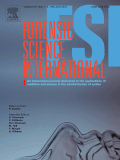
Forensic Science International
Innovating Justice through Interdisciplinary ResearchForensic Science International is a premier journal published by Elsevier Ireland Ltd, dedicated to advancing the field of forensic science through interdisciplinary research and scholarship. Since its inception in 1978, this esteemed journal has provided a platform for vital research, receiving recognition in the Q1 category for both Law and Pathology and Forensic Medicine as of 2023, underscoring its significant impact in these domains. It currently ranks 54th out of 1025 journals in Social Sciences - Law and 51st out of 208 in Medicine - Pathology and Forensic Medicine, placing it in the top echelons of academic journals according to Scopus metrics. Forensic Science International transitioned to Open Access in 2019, ensuring that critical findings are widely available to the global research community and enhancing collaboration among forensic professionals. With a forward-looking scope that evolves to meet the challenges and innovations of forensic science, this journal remains a pivotal resource for researchers, practitioners, and students who are committed to the continued advancement of forensic science and its applications in legal contexts.

JOURNAL OF FORENSIC PSYCHIATRY & PSYCHOLOGY
Fostering Dialogue Between Psyche and Legal PracticeJOURNAL OF FORENSIC PSYCHIATRY & PSYCHOLOGY, published by Routledge Journals, Taylor & Francis Ltd, is a pivotal platform for advancing knowledge at the intersection of psychology, psychiatry, and the legal system. With an ISSN of 1478-9949, this esteemed journal has been providing a critical forum since its inception in 2003, continuing through to 2024, to foster interdisciplinary dialogue among researchers, clinicians, and legal professionals. The journal holds a Q3 category ranking in both Clinical Psychology and Psychiatry and Mental Health, reflecting its important contributions to the field. With a focus on empirical research, theoretical perspectives, and case studies, it aims to enhance the understanding of forensic issues while ensuring ethical considerations in psychological assessments and interventions. Although it currently does not provide open access, the journal's rigorous peer-review process assures high-quality publications. Researchers looking to stay at the forefront of forensic psychology will find this publication indispensable for their scholarly work and practical applications.

Scandinavian Journal of Forensic Science
Empowering forensic practitioners with cutting-edge research.The Scandinavian Journal of Forensic Science is a premier open-access journal published by SCIENDO since 2012, dedicated to advancing the field of forensic science. With its ISSN 2353-0707, this journal provides a platform for researchers, professionals, and students to disseminate their findings on various aspects of forensic investigations, including but not limited to forensic biology, chemistry, toxicology, and crime scene analysis. The journal plays a vital role in promoting collaboration and knowledge exchange among forensic practitioners and academics, ensuring that cutting-edge research is accessible to all. As a part of the reputable SCIENDO publishing group, the Scandinavian Journal of Forensic Science upholds high standards of peer review and editorial rigor, making it an essential resource for those involved in the forensic science community. Readers can benefit from its open-access model, which fosters wide dissemination and enhances the visibility of published works, ultimately contributing to the societal impact of forensic research.

Anil Aggrawals Internet Journal of Forensic Medicine and Toxicology
Exploring the Intersection of Science and JusticeAnil Aggrawals Internet Journal of Forensic Medicine and Toxicology, an esteemed publication in the field of forensic medicine and toxicology, is dedicated to disseminating innovative research and critical insights since 2000. Published by ANIL AGGRAWALS INTERNET JOURNAL FORENSIC MEDICINE & TOXICOLOGY, the journal caters to professionals, researchers, and students keen on advancing their understanding of forensic science, including its intersections with law and public health. Although it currently holds a Q4 quartile ranking in Law, Pathology and Forensic Medicine, and Toxicology, the journal provides a vital platform for underrepresented studies, encouraging a diverse range of scholarly contributions. With its open access model, the journal enhances visibility and accessibility, ensuring that valuable research can reach a wider audience. As the journal continues to evolve, it plays a crucial role in bridging theoretical knowledge and practical applications, thereby enriching the discourse within its fields of study and fostering inter-disciplinary collaborations.
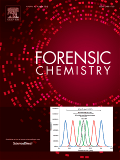
Forensic Chemistry
Unveiling truths with cutting-edge forensic analysis.Forensic Chemistry is a premier journal published by Elsevier, specializing in the interdisciplinary field of forensic science, with a strong emphasis on analytical and materials chemistry, pathology, and law. Established in 2016 and converging to a significant publication trajectory through 2024, the journal has rapidly ascended to an impressive Q1 ranking across multiple categories, demonstrating its impact and commitment to advancing forensic analysis and methodologies. With an impact factor reflecting its relevance—especially notable with a 95th percentile rank in Social Sciences and Law—Forensic Chemistry serves as an essential resource for researchers, legal authorities, and academics seeking to explore the latest developments in forensic techniques and applications. Its rigorous peer-review process and high-quality publications ensure that it remains at the forefront of scientific inquiry in forensic practices. Access to the journal is available without an open access model, further emphasizing its commitment to curated, high-impact scholarship that contributes to both theoretical foundations and practical applications in the forensic field.
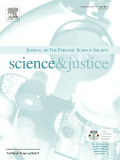
SCIENCE & JUSTICE
Transforming Forensic Practices with Scientific Rigor.Science & Justice is a leading international journal published by Elsevier Science Ltd, dedicated to the interdisciplinary examination of the intersection of justice and science, especially within the realms of forensic science and pathology. Established in 1995, this reputable journal has garnered a commendable Q2 rank in the category of Pathology and Forensic Medicine, reflecting its significant contributions to advancing knowledge in these critical fields. With an ISSN of 1355-0306 and an E-ISSN of 1876-4452, the journal is indexed in Scopus, positioning it in the top 68th percentile among its peers. The objectives of Science & Justice include promoting research that bridges scientific methodologies with justice-related applications, making it an invaluable resource for researchers, professionals, and students alike. As the journal continues to evolve, it aims to interface scientific innovations with forensic practices, thereby enhancing the integrity of justice processes globally. Despite not offering Open Access options, it remains a pivotal reference point within the academic community focused on forensic science methodologies and their legal implications.
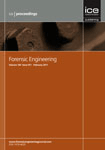
Proceedings of the Institution of Civil Engineers-Forensic Engineering
Advancing Safety Through Forensic InsightsProceedings of the Institution of Civil Engineers - Forensic Engineering is a pivotal journal in the field of forensic engineering, published by Emerald Group Publishing Ltd, a renowned name in academic publishing. With a focus on investigating and understanding the failures of civil engineering structures, this journal provides a critical platform for the dissemination of research and case studies aimed at enhancing safety, risk, and reliability in engineering practices. It holds an important place in the Q4 quartile of the Safety, Risk, Reliability and Quality category as of 2023, and currently ranks #123 out of 207 in its field according to Scopus, reflecting its emerging influence despite its relatively recent establishment in 2011. Researchers, practitioners, and students alike will find valuable insights through non-open access articles that contribute to a deeper understanding of forensic analysis in civil engineering contexts. The journal's mission is to promote discussions that lead to significant advancements in civil engineering safety and reliability, ultimately informing best practices and policy-making in the profession.

Journal of Forensic and Legal Medicine
Unveiling the Science Behind Justice.The Journal of Forensic and Legal Medicine, published by Elsevier, stands at the forefront of interdisciplinary research in the overlapping domains of law, medicine, and forensic science. With an ISSN of 1752-928X and an E-ISSN of 1532-2009, this esteemed journal covers pivotal advancements in the field, spanning from 2007 to 2024. The journal enjoys a distinguished reputation, evidenced by its Q1 ranking in Law and its notable positions in the Scopus Ranks with an 82nd percentile in Social Sciences—Law. As a crucial resource for researchers, practitioners, and students alike, the journal focuses on the vital role of forensic evidence in legal contexts, ensuring the dissemination of high-quality, peer-reviewed articles that contribute to both academic and practical applications in the realm of forensic and legal medicine. Its accessibility to a broad audience, despite not being open access, bolsters its importance in advancing forensic science, policy-making, and medical jurisprudence worldwide.
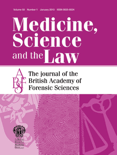
MEDICINE SCIENCE AND THE LAW
Unraveling Complexities in Medicine, Science, and LawMEDICINE SCIENCE AND THE LAW is a prestigious journal published by SAGE PUBLICATIONS INC, focused on the intersection of law, health policy, and ethical issues as they pertain to medicine. With a long-standing history dating back to 1960, this journal has become a crucial platform for scholars and professionals alike to share and disseminate research that shapes the evolving legal landscape surrounding health care practices. It holds notable positions in the academic community, ranking in the Q3 category for Health Policy and Issues, Ethics and Legal Aspects, and achieving a distinguished Q1 ranking in Law as of 2023. With rigorous peer-review standards and a commitment to publishing high-quality research, MEDICINE SCIENCE AND THE LAW is invaluable for those exploring the critical legal challenges and ethical dilemmas faced within the healthcare sector. Research contributions are vital for informing policy and practice, ensuring that the journal remains a relevant and essential resource for researchers, practitioners, and students dedicated to the intersection of law and medicine.

INTERNATIONAL JOURNAL OF LEGAL MEDICINE
Advancing the Intersection of Law and MedicineINTERNATIONAL JOURNAL OF LEGAL MEDICINE, published by SPRINGER, stands at the forefront of research in the fields of legal medicine, pathology, and forensic science. With an ISSN of 0937-9827 and an E-ISSN of 1437-1596, this esteemed journal has successfully maintained its reputation as a leading publication since its inception in 1990, providing a platform for the dissemination of cutting-edge research and case studies. The journal is recognized as a Q1 category publication in the 2023 Pathology and Forensic Medicine quartiles, ranking #44 out of 208 in its category on Scopus, reflecting its significant contribution to the academic community—demonstrated by its impressive 79th percentile. While the journal operates under a traditional subscription model, it is committed to enhancing access to critical insights in legal medicine. The INTERNATIONAL JOURNAL OF LEGAL MEDICINE invites researchers, professionals, and students to explore its manuscripts that shed light on the intersection of law and medicine, thus pushing the boundaries of what is known in these vital fields.